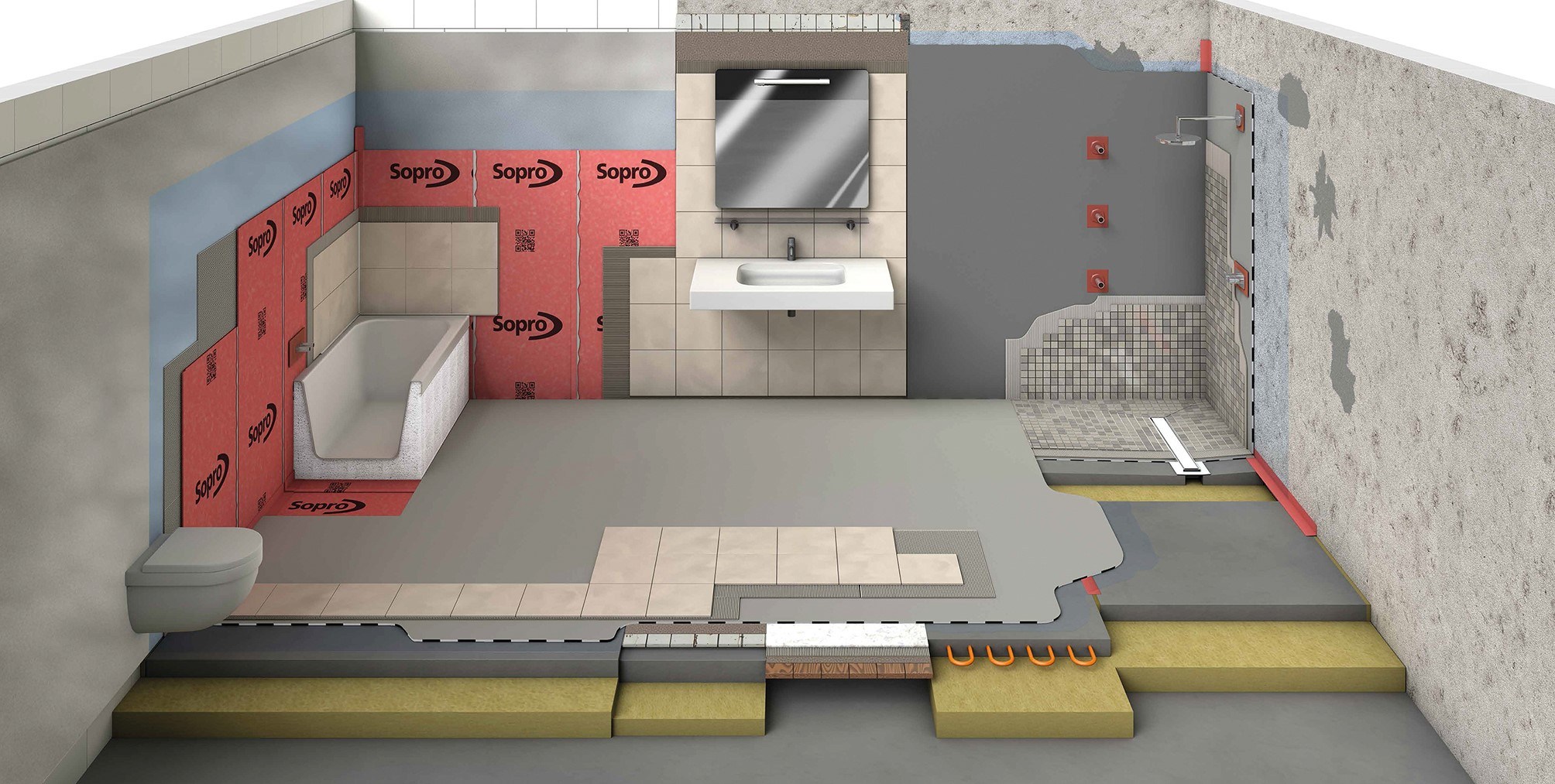Picture this: you’re getting ready for a relaxing bath, the steam rising around you, the warm water cascading down your skin. Suddenly, a chilling thought hits – is your bathroom floor truly protected? What if a leak starts, and you’re left dealing with water damage, mold, and expensive repairs? This unsettling scenario is a reality for many homeowners, and it’s why understanding the importance of bathroom floor waterproofing is crucial.

Image: www.smetbuildingproducts.com
Waterproofing your bathroom floor isn’t just about aesthetics – it’s about safeguarding your home from the insidious effects of moisture damage. This guide will demystify the process, explore the benefits, and equip you with the knowledge to make the right decision for your bathroom.
The Vital Role of Waterproofing: A Shield Against Moisture Damage
Imagine your bathroom floor as a vulnerable fortress, constantly under siege by the relentless force of water. Spills, leaks, and even the simple act of showering can create a moist environment that can lead to devastating consequences. Without proper waterproofing, your bathroom becomes a breeding ground for:
-
Mold and Mildew Growth: Moisture seeps into the subfloor, providing the ideal conditions for these harmful microbes to thrive. Mold can cause serious health problems, ranging from allergies and respiratory issues to more severe conditions like asthma and respiratory infections.
-
Wood Rot and Deterioration: Your floorboards, subflooring, and even the structural integrity of your home are at risk. Rotting wood weakens the foundation, leading to instability, sagging floors, and costly repairs.
-
Staining and Discoloration: Wetness can seep into your flooring, causing unsightly discoloration, and even affecting the appearance of your tiles, grout, and fixtures.
-
Costly Repairs: Ignoring water damage can lead to cascading problems, escalating the repair costs significantly.
When Should You Worry? Understanding the Need for Waterproofing
So, how do you know if your bathroom floor truly needs waterproofing? There’s no one-size-fits-all answer, but here are some key indicators:
-
Older Homes: Bathrooms in older homes often lack the modern waterproofing techniques, making them more susceptible to moisture damage.
-
Recent Renovations: If you’ve recently remodeled your bathroom, it’s vital to ensure the new construction incorporates proper waterproofing.
-
Leaks and Drips: Any visible leaks, drips, or water penetration beneath the floor should be addressed immediately with a thorough waterproofing solution.
-
High Traffic Areas: Bathrooms with a high volume of traffic and frequent water use may benefit from additional waterproofing measures.
-
Subfloor Material: Wooden subfloors are more prone to water damage, whereas concrete subfloors are generally more resilient. However, even concrete floors can be susceptible to moisture penetration in certain situations.
-
Location and Climate: Bathrooms in humid climates or those located on lower floors with potential for groundwater intrusion are at higher risk.
The Layers of Protection: Different Waterproofing Approaches
Understanding the different approaches to waterproofing will help you choose the most appropriate solution for your bathroom:
-
Membrane Barriers: These flexible materials, like rubberized membranes or liquid-applied coatings, act as a waterproof shield between the subfloor and the finished flooring. They effectively seal off any potential leaks or moisture penetration.
-
Waterproof Mortar and Grout: Specifying waterproof mortar and grout is crucial for tile installations, as they prevent moisture from seeping between the tiles, ultimately protecting the subfloor.
-
Shower Pan Liners: These waterproof liners are specifically designed to protect the areas beneath and around your shower, preventing water from escaping and causing damage.
-
Waterproofing Paints: Specialized paint formulations offer an added layer of protection against moisture, especially for concrete subfloors.

Image: 1svoimi-rukami.ru
The Importance of Professional Expertise
While some DIY waterproofing solutions are available, a professional is often the best choice for achieving long-lasting protection. A skilled contractor can accurately assess your bathroom’s needs, determine the appropriate waterproofing techniques, and ensure a seamless, high-quality installation that will stand the test of time.
Maintaining Your Waterproofing Investment: A Little Prevention Goes a Long Way
Once your bathroom floor is properly waterproofed, it’s important to maintain the investment to ensure its effectiveness. Here are some key preventive measures:
-
Regular Inspection: Periodically check for any signs of leaks, water penetration, or damage to the waterproofing materials.
-
Prompt Maintenance: Address any issues you find immediately to prevent them from escalating into larger problems.
-
Proper Drainage: Ensure your bathroom is equipped with a well-functioning drain system to effectively remove water.
-
Preventative Seals: Regularly apply sealant to shower pans, tubs, and around fixtures to prevent leaks.
Do I Need To Waterproof My Bathroom Floor
The Peace of Mind that Comes with a Waterproofed Bathroom
Investing in bathroom floor waterproofing might seem like an added expense, but the peace of mind it provides is priceless. Knowing that your home is protected from moisture damage and its associated health risks, gives you the confidence to enjoy your bathroom, free from the worry of hidden problems.
Think of it as an insurance policy against costly repairs, potential health issues, and long-term damage to your home. By taking the necessary steps to waterproof your bathroom floor, you’re making a wise investment in your home’s longevity, its health, and your own well-being.





